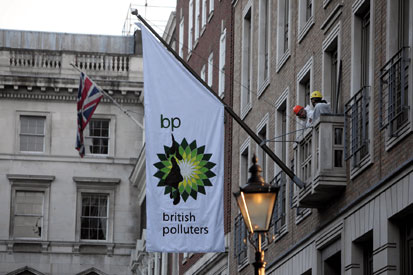
The energy company is to follow up a $50m US TV ad campaign with global digital activity aimed at defending its role in the crisis.
It will spend up to $1m a month buying keyword search terms on Google and YouTube and has dedicated resources
to responding to queries and comments made on social-media sites.
President Obama recently criticised BP's spending on TV ads, suggesting the money could have been better used to help ‘fishermen or small businesses here in the Gulf who are having a bad time'.
Nonetheless, the company plans to continue running a series of campaigns informing the public of its efforts to clean up the oil.
The latest is a digital campaign that directs web users entering relevant search terms to a dedicated BP website. A sponsored link, running globally on Google, includes the message: ‘Learn more about how BP is helping.'
Similarly, searches on YouTube that include keywords such as ‘oil spill' and ‘BP' bring up a link to a video message from embattled BP chief executive Tony Hayward.
The activity, which also includes Flickr, Twitter and Facebook, is being implemented by Purple Strategies, a US agency that specialises in handling controversial public issues.
According to Giles Palmer, chief executive of Brandwatch, which measures companies' online reputations, BP's standing has been damaged by its poor management of the crisis. However, he believes that the company can still regain some of the trust it has lost.
‘Imagine the celebrations around the world if we all felt part of the efforts to cap this leak,' he said. ‘It could actually provide BP with an amazing platform to show just what it will do when the chips are down. This may be asking a lot, but it could happen.'
Meanwhile, BP has been targeted by environmental campaigners. Greenpeace placed a banner on the company's London offices branding it ‘British Polluters' and has launched a competition inviting the public to redesign BP's logo.


.jpg)


.jpg)